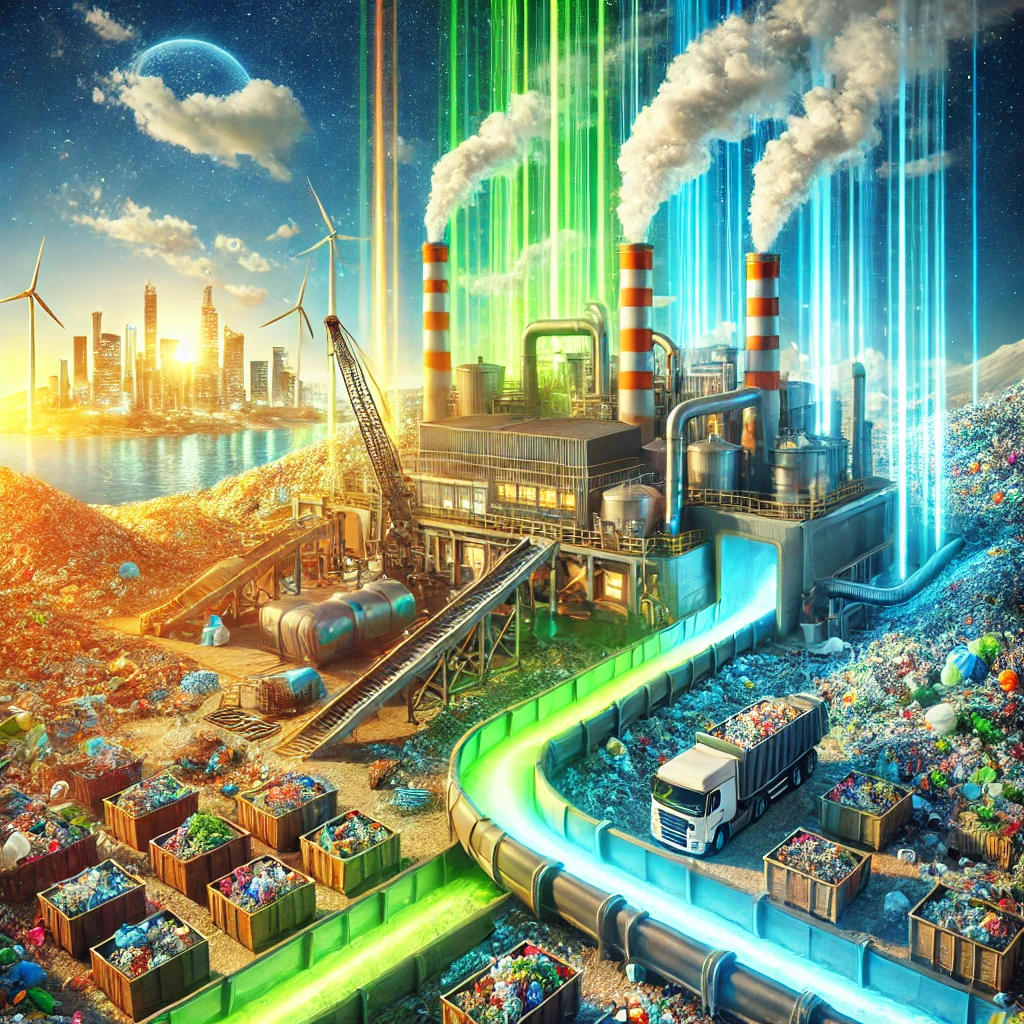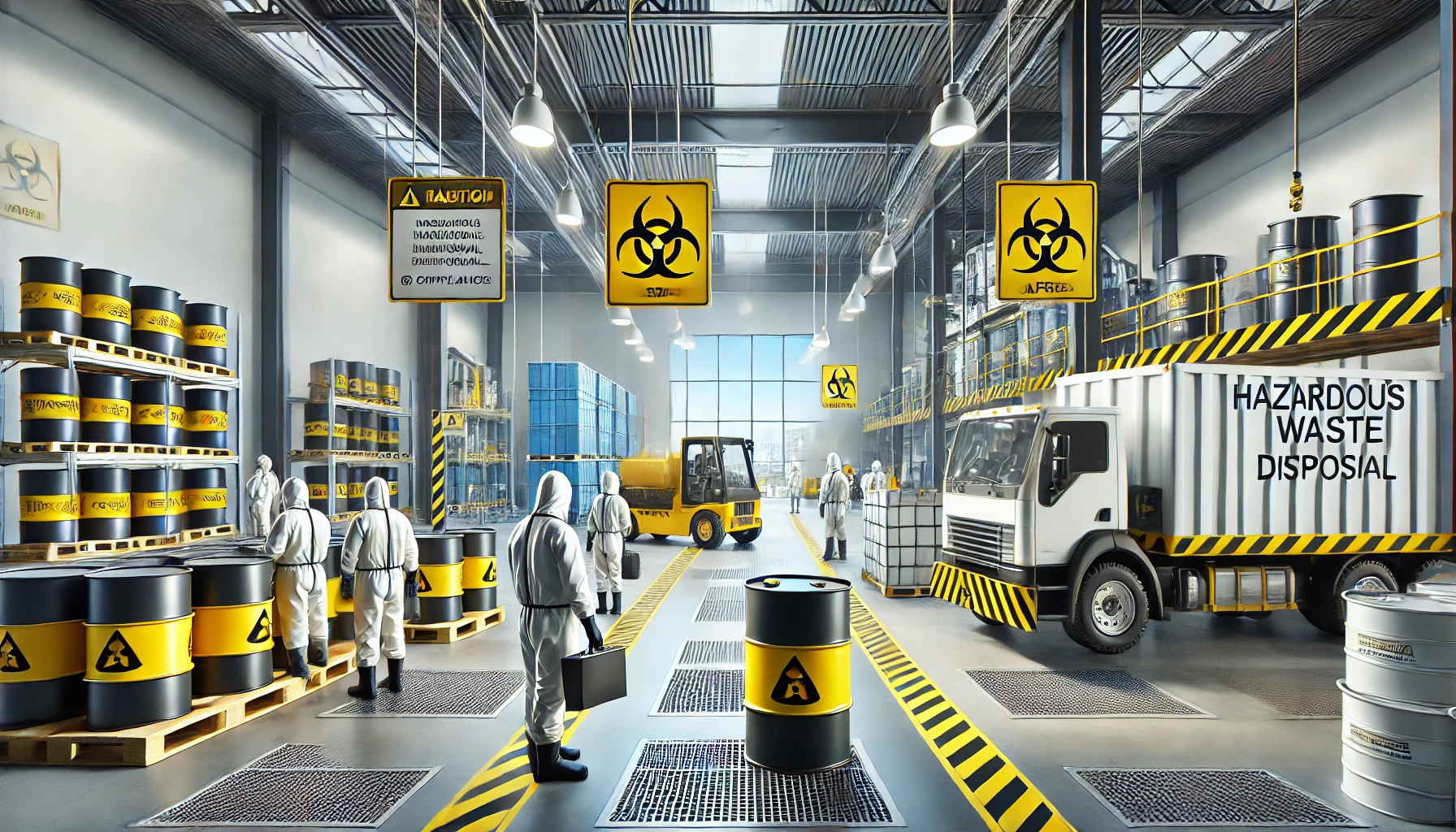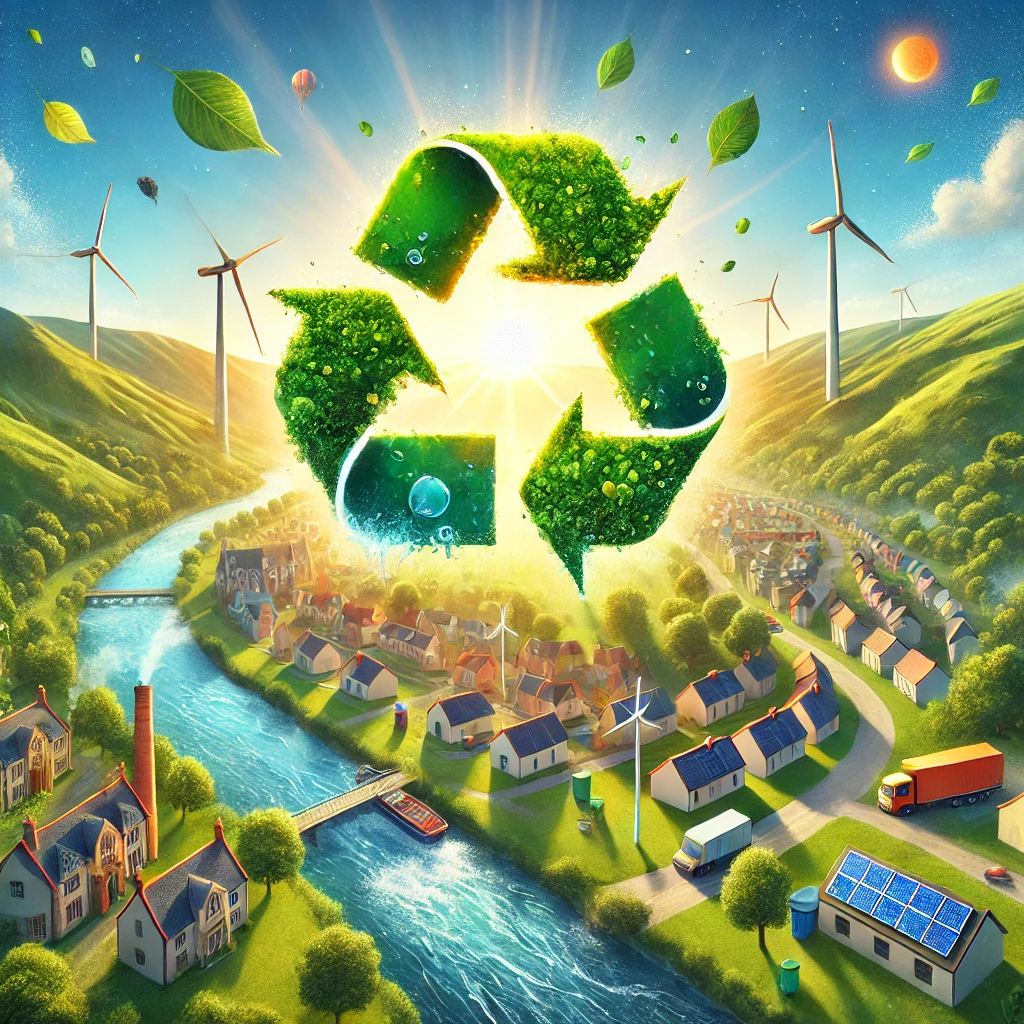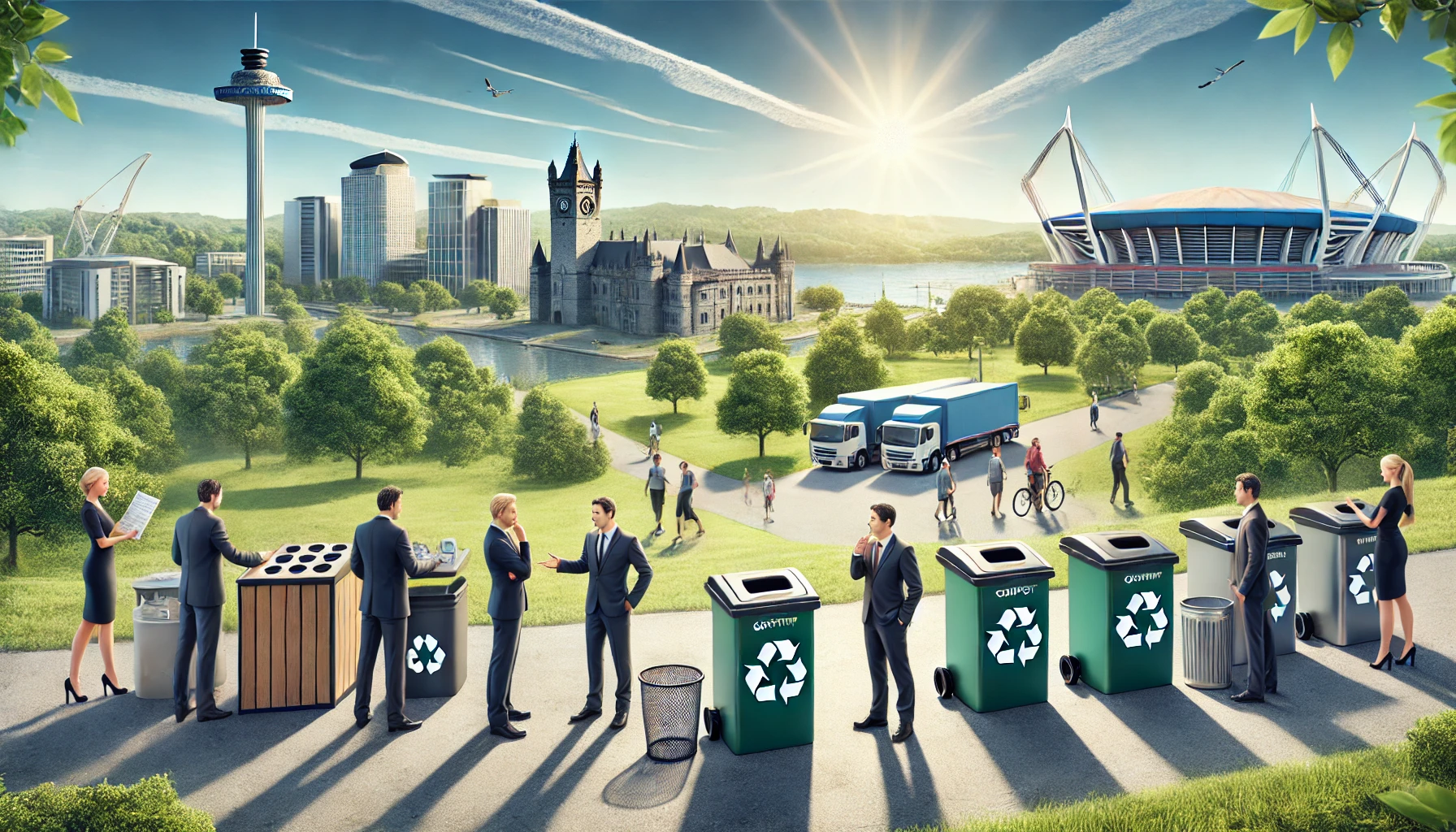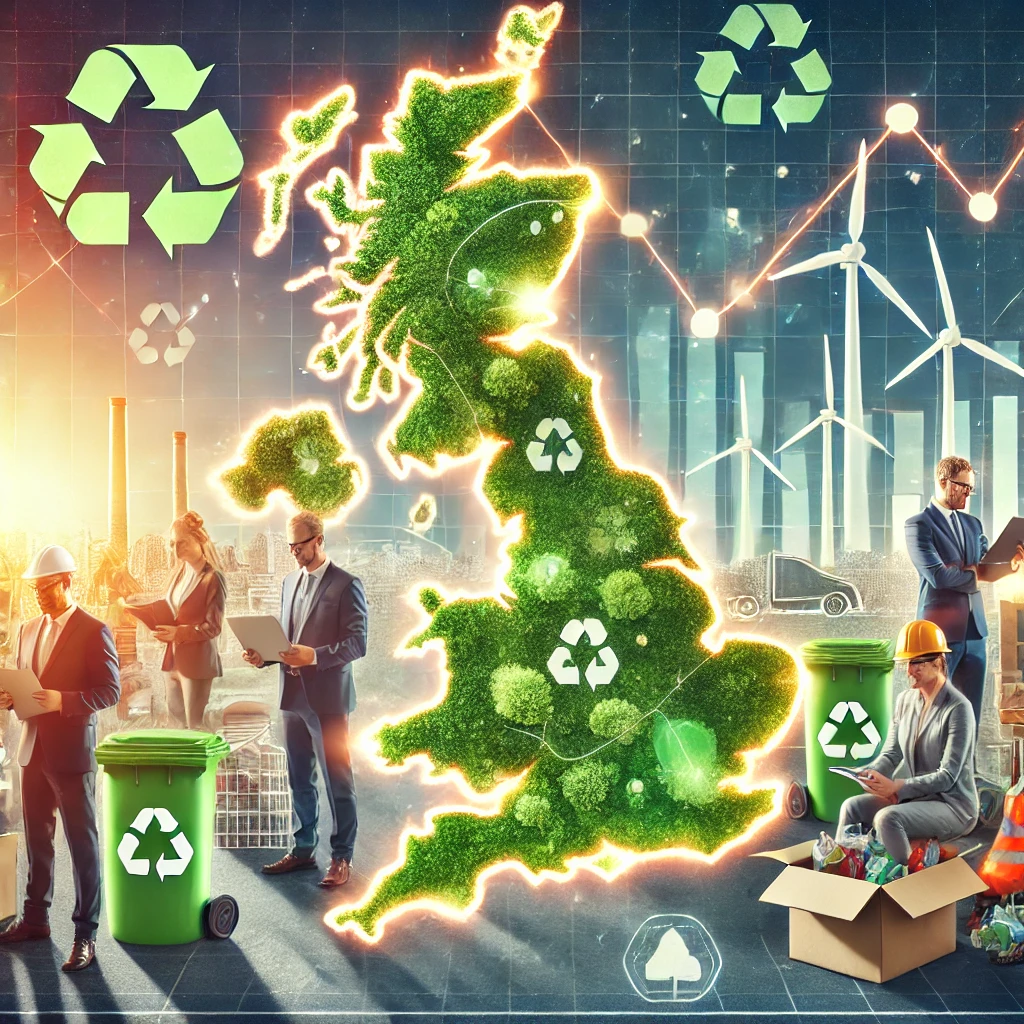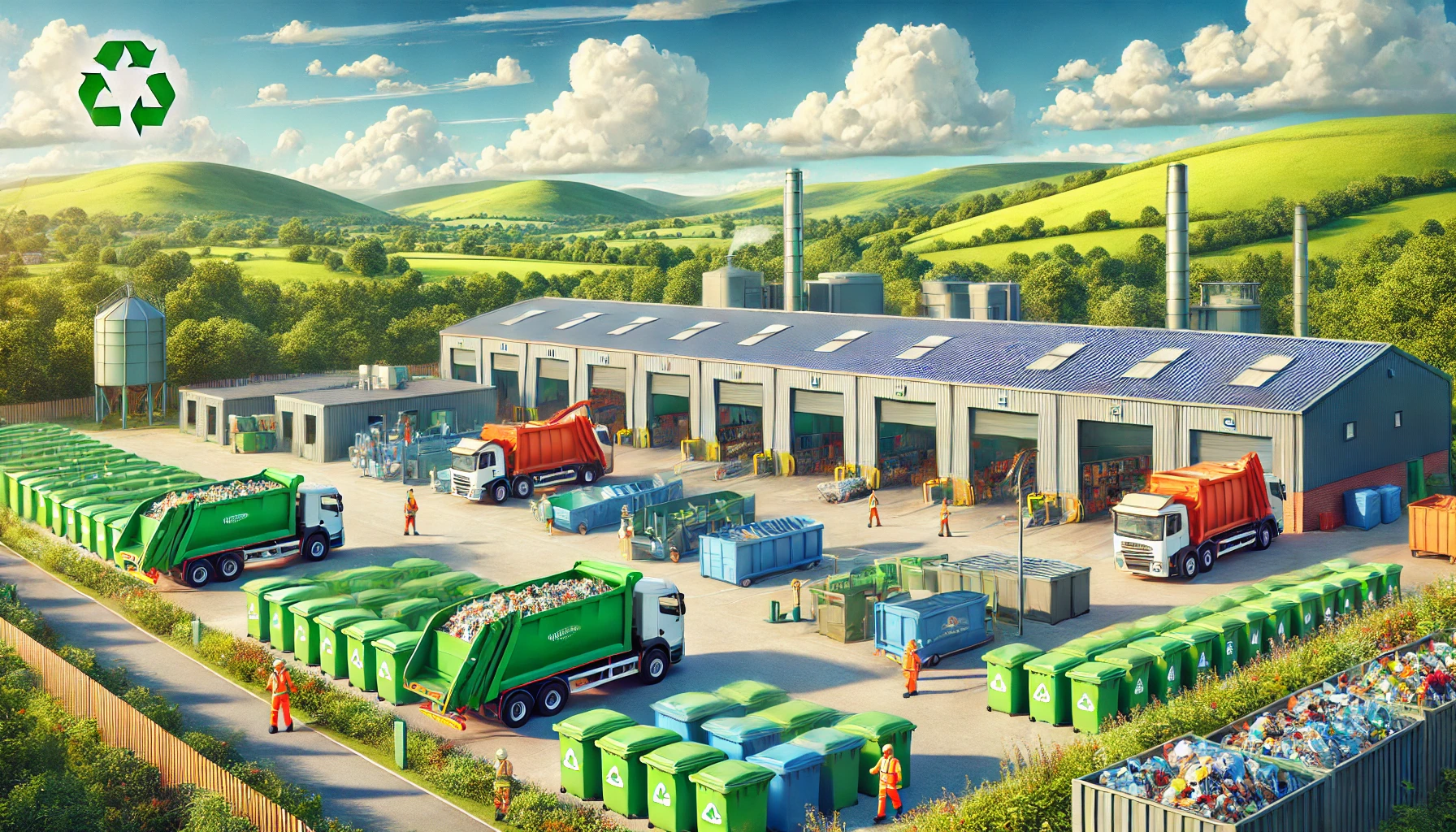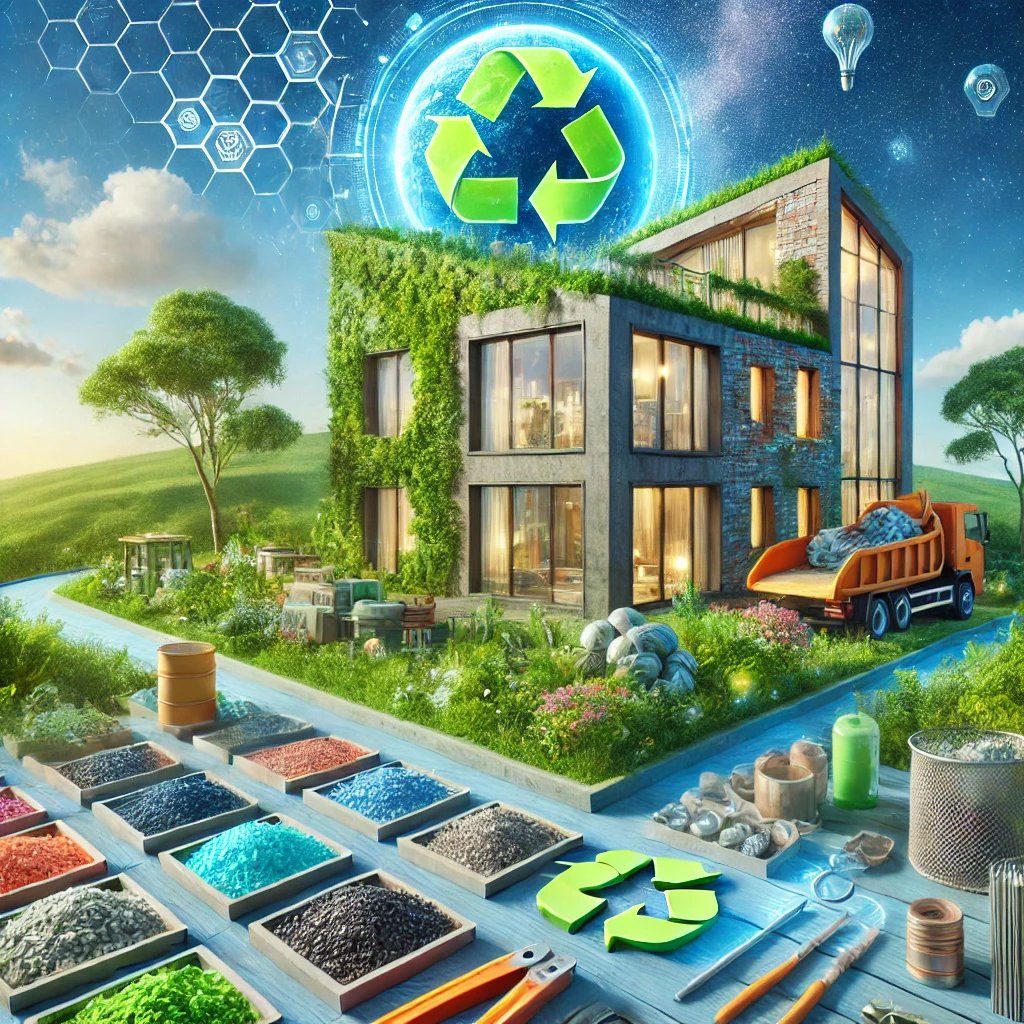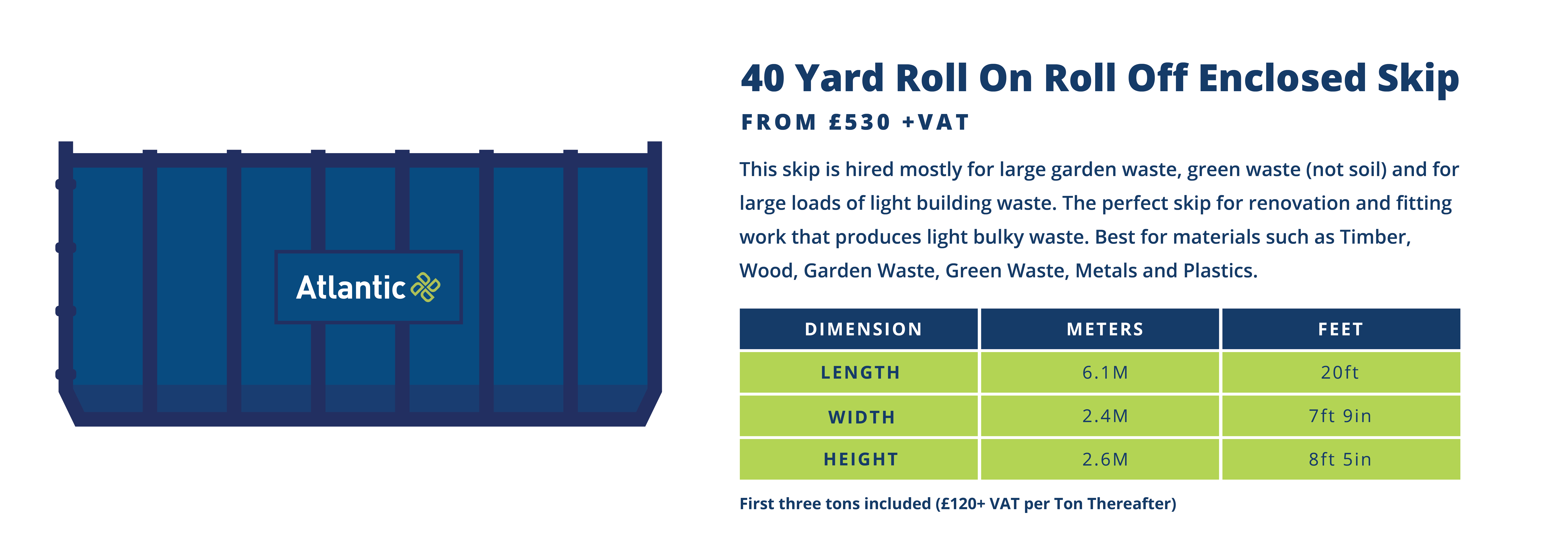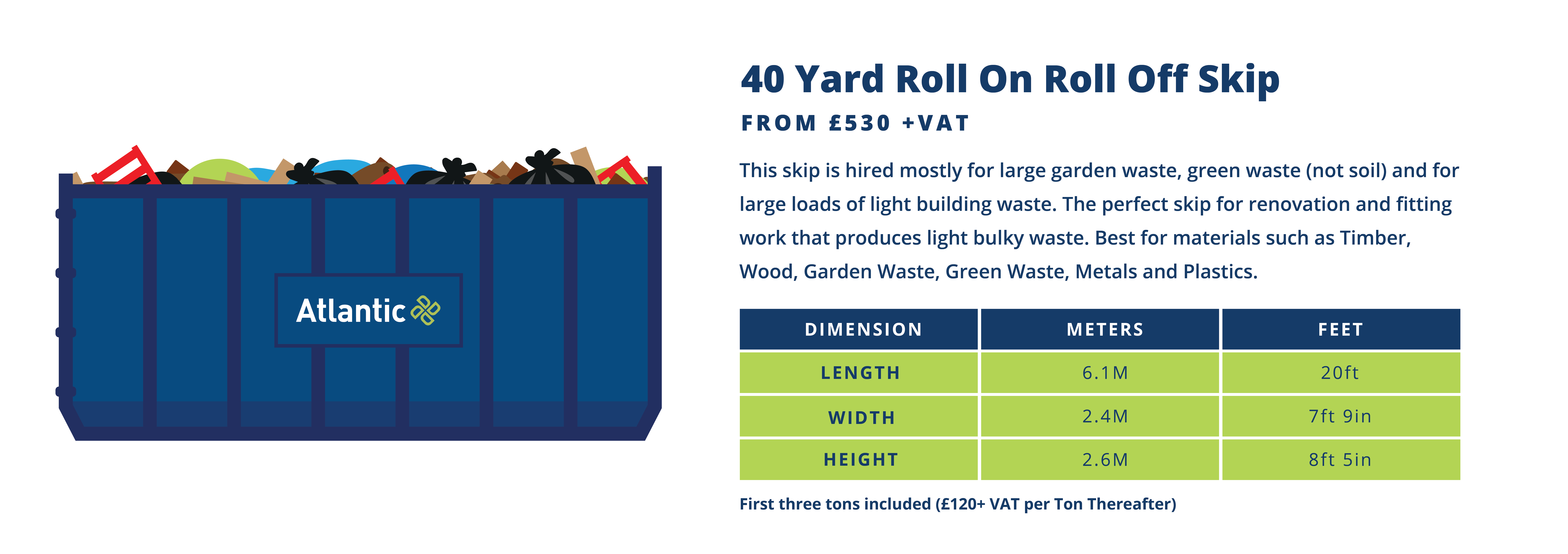Understanding Waste Fuel Production: Turning Waste into Energy
Introduction
Waste fuel production is a process for converting various kinds of waste into usable energy sources, thus addressing issues in waste management and energy provision. This will reduce waste going to landfills, offer alternative fuels, conserve natural resources, and lower environmental pollution. Waste converted into energy reduces waste material going to landfills or even the emission of chemicals that might damage the surroundings.
Types of Waste Fuels
Waste fuels are classified according to origin materials and processing technologies into:
- Solid Recovered Fuel (SRF): SRF results from non-hazardous waste materials such as plastics, paper, textiles, or wood. These materials are subjected to processing to produce high-calorific fuel meant for industrial furnaces and power plants, replacing traditional fossil fuels.
- Refuse-Derived Fuel (RDF): RDF is created by processing MSW into combustible constituents like non-recyclable plastics and organic waste. The fuel is then produced by shredding, screening, and eliminating the noncombustible fractions for use at energy recovery facilities.
- Biofuels: Bio-derived fuels from organic waste, including biodiesel and biogas. Biodiesel can be produced through transesterification between waste oils and fats; on the other hand, biogas is generated through anaerobic digestion of organic materials such as food waste or agricultural residues. These provide renewable energy for transportation and heating.
Process of Waste Fuel Production
The production of fuel from waste undergoes different key stages:
Collection and Segregation: Efficient waste fuel production begins with the systematic collection and segregation of waste materials. Proper sorting removes recyclable and non-combustible items, leaving a feedstock rich in energy potential. This step is crucial for maintaining the quality and consistency of the resulting fuel.
Processing Technologies:
- Mechanical Treatment: Mechanical processes like shredding and drying reduce waste materials' size and moisture content, making them more combustible. Shredding enables uniform particle size while drying reduces moisture, increasing the fuel's calorific value.
- Chemical Treatment: Pyrolysis and gasification are advanced chemical processes that thermally decompose waste materials in low-oxygen environments. Pyrolysis converts waste into char, oil, and syngas, whereas gasification produces syngas—a mixture of carbon monoxide and hydrogen—that can be used for energy generation.
- Biological Treatment: Biological processes, especially anaerobic digestion, involve the microbial breakdown of organic waste in oxygen-free conditions. This results in biogas (primarily methane) and digestate, which can be used as a soil conditioner. Anaerobic digestion is widely applied to manage organic wastes, contributing to renewable energy production.
The final product is the conversion of wastes into usable fuels, including SRF, RDF, biodiesel, and biogas. Such fuels can be burned to produce heat and power or, if needed, processed for use in particular applications. This is the closest approximation to closing the loop on waste management and energy generation.
By integrating these processes, waste fuel production would address waste disposal challenges and contribute to sustainable energy solutions toward meeting environmental conservation and resource efficiency goals.
Advantages of Waste Fuel Production
Waste fuel production provides important environmental, economic, and energy security benefits:
Environmental Benefits
Landfill Use and Greenhouse Gas Emissions Reduction: Converting waste into energy reduces the amount of waste sent to landfills, thus reducing methane emissions, a potent greenhouse gas. This process reduces environmental pollution and helps mitigate climate change.
Natural Resources Conservation: Using waste as fuel reduces reliance on virgin resources. It also helps conserve resources and prevents degradation of the environment.
Economic Benefits
Savings on Waste Disposal and Energy Production: WtE technologies can recover the cost of waste management by generating revenue from energy production, helping to build economic resilience.
Job Creation in Waste-to-Energy Industry: Construction, engineering, and facility management jobs are created from developing and operating WtE facilities that contribute to local economic development.
Energy Security
Variety of Energy Sources and Reduced Dependence on Fossil Fuels: WtE technologies can be used as alternative energy sources, reducing dependence on fossil fuels and enhancing energy security.
Challenges in Waste Fuel Production
Waste fuel production has several challenges associated with it despite its many advantages:
Technological Barriers
Current processing technologies are challenged by the heterogeneity of waste materials, which hampers conversion processes.
Economic Feasibility
High capital and operational costs associated with WtE infrastructure hinder economic feasibility, especially in financially constrained regions.
Regulatory and Social Issues
Public concerns about emissions and environmental impact necessitate stringent regulations and transparent policies to ensure community acceptance and environmental compliance.
Innovations in the Production of Waste Fuel
With technological advancement, challenges hitherto faced in the production of waste fuel are being looked into:
Emerging technologies
Advances like artificial intelligence for waste sorting and plasma gasification make it efficient to increase the varieties of waste that can be further converted to energy.
Circular economy integration
WtE technologies align with the principles of a circular economy because they recover energy from waste. This means that less new resource extraction is required, and environmental impacts are minimised.
Global Examples
Countries such as Sweden and Japan have implemented WtE projects that have proven successful in viability and benefits to sustainable waste management and energy production.
Waste fuel production can address challenges and create innovative opportunities, paving a crucial way forward for sustainable waste management and energy production.
Case Studies
Regional Models
In South Wales, the Newport WtE facility is a model of successful waste fuel production. This power plant burns RDF, the locality's main source of industrial, commercial, and municipal waste. It produces about 20 MW of energy, powering 50,000 homes per year. By removing recyclables from residual waste, the plant cuts down on landfill reliance while helping to supply local power.
Internationally, Denmark has an innovative WtE plant at Amager Bakke in Copenhagen. Beyond burning waste for energy, its most impressive feature is its public ski slope on the roof and recreational area, which combines sustainability with the lifestyle of urban living. Four hundred thousand tons are processed annually through the plant, providing electricity and district heating for thousands of households.
Lessons Learned
These cases highlight the importance of integrating advanced technology, community engagement, and environmental considerations in WtE projects. Success is achieved through meticulous planning, transparent communication with stakeholders, and adherence to stringent environmental standards. Such projects demonstrate that WtE facilities can effectively manage waste and contribute to sustainable energy production when aligned with community needs and environmental goals.
Conclusion
Waste fuel production is important in sustainable waste management and energy generation. It reduces the use of landfills, decreases the emission of greenhouse gases, conserves natural resources, and enhances energy security by converting waste into energy. Thus, governments, businesses, and individuals must embrace and promote waste-to-energy technologies to fully realise such benefits. It will transform waste into a useful resource and pave the way to a sustainable future in which waste will be an essential component of energy production.
References
- com. (n.d.). DP CleanTech: Newport Waste-to-Energy project in South Wales. Retrieved from https://www.dpcleantech.com/medias/dp-news/dp-cleantech-contracted-to-supply-flue-gas-treatment-for-efw-project-in-newport-south-wales
- org. (2024). The future of waste-to-energy: A vision for a sustainable world. Retrieved from https://green.org/2024/01/30/the-future-of-waste-to-energy-a-vision-for-a-sustainable-world/
- gov. (n.d.). Trash to treasure: The benefits of waste-to-energy technologies. Argonne National Laboratory. Retrieved from https://www.anl.gov/article/trash-to-treasure-the-benefits-of-wastetoenergy-technologies
- org. (2024). Waste-to-energy technologies and their environmental impact. Retrieved from https://green.org/2024/01/30/waste-to-energy-technologies-and-their-environmental-impact/
- com. (n.d.). Waste-to-energy in the transition to a circular economy. Oxford Research Encyclopedia of Environmental Science. Retrieved from https://oxfordre.com/environmentalscience/abstract/10.1093/acrefore/9780199389414.001.0001/acrefore-9780199389414-e-492
- biomedcentral.com. (2019). Innovations in waste-to-energy technologies: AI and plasma gasification. BMC Energy. Retrieved from https://bmcenergy.biomedcentral.com/articles/10.1186/s42500-019-0004-7
- StartUs Insights. (2025). Top 8 recycling technology trends in 2025. Retrieved from https://www.startus-insights.com/innovators-guide/recycling-technology-trends-innovation/
- org. (2024). Economic resilience and waste-to-energy: Lessons from global leaders. Retrieved from https://green.org/2024/01/30/economic-resilience-and-waste-to-energy-lessons-from-global-leaders/
- springer.com. (2020). Pyrolysis and gasification for waste-to-energy conversion. Springer. Retrieved from https://link.springer.com/article/10.1007/s10311-020-01177-5
- com. (n.d.). Trends in the use of solid recovered fuels. International Energy Agency Bioenergy. Retrieved from https://www.ieabioenergy.com/wp-content/uploads/2020/05/Trends-in-use-of-solid-recovered-fuels-Main-Report-Task36.pdf
Navigating Hazardous Waste Disposal: Ensuring Safety and Compliance
Introduction
Hazardous waste generally refers to materials that seriously threaten public health and the environment because of their toxicity, corrosiveness, flammability, or reactivity. Some examples include industrial chemicals, biomedical waste, electronic waste known as e-waste, and some household products containing batteries and solvents. The consequences will be serious environmental degradation coupled with health problems like respiratory conditions and contamination of waters. Therefore, safe and compliant hazardous waste disposal practices are important to mitigate these risks and protect environmental and public health.
Categories of Hazardous Waste
Hazardous waste is categorized into several categories based on its origin and composition:
- Chemical Waste: From industrial and laboratory activities, chemical waste includes substances like solvents, acids, and heavy metals. These materials can be highly toxic and require specialised handling to prevent environmental contamination.
- Medical Waste: Medical waste, which originates from healthcare facilities, includes biomedical materials, sharps, and pharmaceuticals. If not disposed of appropriately, it can spread infections and pose serious health hazards to waste handlers and the public.
- Electronic Waste: It includes discarded electronic items, such as computers, mobile phones, and television sets, which comprise lead, mercury, and cadmium. E-waste is hazardous because it releases such materials into the atmosphere, eventually polluting water and soil.
- Household Hazardous Waste: Paints, solvents, batteries, and pesticides are some of the household products in this category. Although these are daily-use products, improper disposal can be hazardous, leading to environmental damage and health hazards.
Why Safety Matters in Hazardous Waste Disposal
There are several reasons why hazardous waste needs to be disposed of properly:
- Human Health Implications: Exposure to harmful wastes can lead to dangerous human health conditions, ranging from chemical burns and respiratory distress to long-term conditions, including cancer. For example, improper disposal methods lead to environmental pollution and hazards to human health.
- Environmental Impact: Inefficient disposal practices can cause toxic pollution of soil, water, and air, harming ecosystems and biodiversity; dangerous waste or improper, dangerous waste treatment, such as burning, can directly damage communities and waste workers.
- Regulatory Requirements: They are very important to avoid legal fines and ensure community safety. The U.S. Environmental Protection Agency (EPA) regulates hazardous wastes under the Resource Conservation and Recovery Act (RCRA) to protect human health and the environment.
Generally speaking, recognising hazard categories and the importance of safety disposal is paramount in preserving human health and the environment. Compliance with these regulatory frameworks ensures that materials are well managed, avoiding risks which may be occasioned.
Key Steps in Hazardous Waste Disposal
Proper hazardous waste management requires several key steps to ensure safety and regulation compliance:
Identification and Classification
The first basic procedure is the proper identification and categorisation of hazardous waste. In the UK, hazardous waste contains substances poisonous to humans or the environment. Some examples include asbestos, chemicals like brake fluids, batteries, solvents, pesticides, oils (not food-grade), and appliances that contain ozone-depleting substances. A firm must classify its waste so that it will determine if it is hazardous.
Proper Storage and Handling
Once identified, hazardous waste must be stored safely to avoid leaking, spilling, and contaminating. This includes using appropriate containers clearly labelled with contents and hazard symbols. Containers must be kept in designated secure areas with secondary containment measures to manage potential spills. Regular inspections and staff training must be conducted to maintain safety standards.
Transportation
Transporting hazardous waste must be done under strict regulations to ensure safe delivery to disposal facilities. In the UK, businesses must use authorised waste carriers registered with the Environment Agency. Each consignment must be accompanied by a note detailing the type of waste, quantity, and destination. This documentation ensures traceability and compliance throughout the transportation process.
Disposal Methods
- Incineration: High-temperature incineration can completely break down hazardous constituents; thus, volume reduction and neutralisation of hazardous substances can be achieved. It is used for dangerous organic wastes.
- Landfill Disposal: Hazardous wastes that can be landfilled will not leach dangerous substances or gases into the environment. Landfill disposal is practised with caution, as it may cause long-term environmental hazards.
- Recycling or Reprocessing: When feasible, recycling hazardous waste, such as reclaiming metals from electronic waste, minimises environmental impact and conserves resources.
Record-Keeping
Maintaining comprehensive records is vital for regulatory compliance and environmental responsibility. Businesses must keep records of waste classification, storage, transportation, and disposal activities for at least three years. These records facilitate audits and ensure accountability in hazardous waste management.
Regulations Governing Hazardous Waste Disposal
Hazardous waste disposal is protected from health and environmental damage through international agreements and local laws.
International Standards
The Basel Convention is an important international treaty governing the international movement and disposal of hazardous wastes. It promotes practices to reduce the generation of hazardous wastes and ensures environmental responsibility in each country's management of them.
In the UK, for instance, hazardous waste management falls under regulations like the Hazardous Waste (England and Wales) Regulations 2005. These regulations outline the framework for controlling and monitoring dangerous waste movements. The Environment Agency is responsible for ensuring compliance. It will ensure that the waste generator follows proper storage, handling, and disposal practices.
Challenges in Compliance
Businesses face a series of challenges in complying with hazardous waste regulations, some of which include:
- Complexity of the Rules: It is very confusing for small businesses to understand the fine print of the rules.
- Cost: Incurring the costs of waste management that is compliant with all regulations can be expensive.
- Tracking Changes: Keeping abreast of regulation changes is an ongoing process.
To surmount these challenges, businesses should train their employees, seek advice from environmental specialists, and develop robust waste management strategies.
Innovations in Hazardous Waste Disposal
Advancements in technology are enhancing the efficiency and safety of hazardous waste management:
Emerging Technologies
- Plasma Arc Technology: This method uses high-temperature plasma to convert hazardous waste into inert slag and syngas, effectively neutralising toxic components.
- Chemical Neutralization: Advanced chemical treatments, including neutralisation, oxidation, and reduction, transform hazardous substances into less harmful forms, mitigating disposal risks.
Sustainable Solutions
Efforts to recycle hazardous components are gaining momentum. For instance, certain electronic wastes are processed to recover valuable metals, thus avoiding raw material extraction and minimising environmental impact.
Global Best Practices
Germany, for instance, has integrated comprehensive hazardous waste management programs, combining advanced technologies with strict regulations, thus providing an ideal model for effective waste disposal.
Case Studies
Local Example
The UK has hazardous waste management programs focused on proper classification, storage, and disposal. These programs ensure compliance with national and international regulations.
Global Example
Germany's hazardous waste management system is known to be efficient. It uses the latest technologies and stringent regulatory frameworks to minimise environmental impact.
Lessons Learned
These examples point out the following:
- Robust Regulatory Frameworks: Clear and enforceable regulations are essential.
- Technological Innovation: Investment in advanced treatment technologies enhances safety and efficiency.
- Public Awareness and Training: Stakeholder education to the best practice.
Conclusion
Ensuring safe and compliant hazardous waste disposal is critical in protecting human health and the environment. Businesses and governments can effectively manage dangerous waste by following regulations, embracing new technologies, and learning from successful case studies. This will be achieved through a collaborative approach involving continuous education, investment in advanced disposal methods, and strict compliance with legal frameworks for a sustainable future.
References
- Environment Agency. (n.d.). Hazardous waste: Overview and regulations. GOV.UK. Retrieved from https://www.gov.uk/dispose-hazardous-waste
- Environment Agency. (n.d.). Producers and holders of hazardous waste. GOV.UK. Retrieved from https://www.gov.uk/dispose-hazardous-waste/producers-and-holders
- gov.uk. (2005). Hazardous Waste (England and Wales) Regulations 2005. Retrieved from https://www.legislation.gov.uk/uksi/2005/894/contents
- S. Environmental Protection Agency. (2023). Household hazardous waste. EPA. Retrieved from https://www.epa.gov/hw/household-hazardous-waste-hhw
- World Health Organization. (n.d.). Compendium on health and environment: Solid waste. WHO. Retrieved from https://www.who.int/tools/compendium-on-health-and-environment/solid-waste
- Stanford University. (2021). Plasma arc technology in waste treatment. Retrieved from https://large.stanford.edu/courses/2021/ph240/jibodu2/docs/intech-18.pdf
- Ergen Environmental. (2023). Innovations in hazardous waste management: Emerging technologies and practices. Retrieved from https://ergenvironmental.com/industry-news-blog/innovations-in-hazardous-waste-management-emerging-technologies-and-practices
- (2020). Waste incineration for hazardous waste management. Retrieved from https://link.springer.com/chapter/10.1007/978-3-030-95262-4_10
- Basel Convention Secretariat. (n.d.). The Basel Convention on the control of transboundary movements of hazardous wastes and their disposal. UNEP. Retrieved from http://www.basel.int/
- org. (2024). Sustainable solutions for hazardous waste management. Retrieved from https://green.org/2024/01/30/sustainable-solutions-for-hazardous-waste-management
The Role of Recycling in Achieving Environmental Sustainability in South Wales
Introduction
Recycling is an integral part of environmental sustainability, playing a critical role in conserving natural resources, reducing greenhouse gas emissions, and minimising waste sent to landfills. In South Wales, recycling initiatives have been instrumental in addressing the region's unique environmental challenges, such as limited landfill space and the need to protect diverse ecosystems. The Welsh Government prioritised recycling, increasing waste management techniques' effectiveness. This paper explores recycling methods in South Wales, considers its environmental advantages, and details the challenges and opportunities facing these efforts in attaining sustainable gains through recycling.
Current Recycling Practices in South Wales
South Wales has made excellent improvements in recycling, where local councils have collectively reached a 67% recycling rate in the 2023/24 period, higher than the UK average of 44.1% (My Recycling Wales, n.d.; Department for Environment, Food & Rural Affairs [DEFRA], 2023). This is because of the effective collaboration between local councils, waste management companies, and community-based initiatives. For example, councils have developed thorough curbside recycling programs, while companies like Veolia have designed advanced materials recovery facilities to process recyclables efficiently. Community-led initiatives complement these efforts by promoting participation and awareness among the public to increase recycling rates.
Despite these achievements, challenges persist. Contamination of recyclable materials remains a significant barrier, often resulting from improper sorting by residents. Additionally, varying public awareness about recycling protocols can hinder effective waste management. Financial constraints also impact the expansion and maintenance of recycling infrastructure. Addressing these challenges requires ongoing education, investment, and policy support to sustain and improve recycling efforts in South Wales.
Environmental Benefits of Recycling
Recycling holds significant environmental benefits, particularly in reducing reliance on landfills. Diverting waste from landfills reduces methane production, a potent greenhouse gas that causes climate change (Friends of the Earth, 2017). This reduction in landfill use is important for South Wales, where available landfill space is limited.
Besides, recycling conserves natural resources by repurposing materials such as metals, plastics, and paper; thus, the demand for the extraction of virgin resources will be reduced. This conservation prevents ecosystems from destruction and reduces pollution linked to mining and timber clearing (U.S. Environmental Protection Agency [EPA], 2023).
Recycling also plays a critical role in lowering the carbon footprint. Generally, producing products from recycled materials consumes less energy than using new raw materials, which reduces greenhouse gas emissions. For instance, recycling aluminium saves up to 95% of the energy required to produce the same amount from raw materials (Sustainability Success, 2022). In South Wales, high recycling rates have avoided nearly 387,000 tonnes of CO ₂ emissions, which clearly emphasises the high environmental impact of robust recycling programs.
Economic and Social Gains of Recycling
Recycling has a massive impact on the economy by providing jobs and revenue from recycling materials. In Wales, the recycling industry provides various employment opportunities in collection, processing, and resale, enhancing the local economy. According to the Welsh Government's "Beyond Recycling" strategy, reusing and recycling are integral elements of the foundational economy that use local resources to benefit the community (Welsh Government, 2021).
Community involvement is the other necessary aspect of recycling programs. Activities such as repair hubs and reuse have successfully minimised waste generation and strengthened the social community. Not only are such initiatives effective in material diversion from landfills, but they also improve social capital because they offer a source of skills and work for communities (Centre for Climate Change and Social Transformations, 2022).
This enables resources to be used for as long as possible and avoids wasting anything. Raw material extraction is minimised, as are harmful environmental effects. One such commitment to a circular economy is shown in high recycling rates and strategic initiatives on sustainable resource management in Wales, as seen in 2021 by the Welsh Government.
Strategies to Enhance Recycling in South Wales
Improving recycling in South Wales requires a multi-dimensional approach:
- Infrastructure: Better Recycling Plants and Efficient Waste Collection: South Wales needs to invest in state-of-the-art recycling facilities and effective waste collection systems. The advanced infrastructure will allow for the treatment of more diverse materials and increase recycling capacity overall.
- Public Awareness Campaigns: Proper awareness campaigns among residents on correct recycling practices are crucial. These campaigns can reduce contamination levels and lead to increased participation in recycling activities.
- Legislative Measures: Implementing policies such as Extended Producer Responsibility (EPR) and Deposit Return Schemes (DRS) holds producers accountable for the lifecycle of their products, incentivising sustainable design and recycling efforts. Wales has trialled a pioneering Digital Deposit Return Scheme, demonstrating innovative approaches to recycling (Herald. Wales, 2023).
- Collaboration: Partnerships with local councils, businesses, and environmental organisations are critical. Collaborative efforts can lead to shared resources, knowledge exchange, and coordinated actions that enhance recycling outcomes.
Case Studies
Successful recycling initiatives in South Wales include:
- Council-Led Program: The Welsh Government's "Beyond Recycling" strategy has propelled Wales to become one of the top recycling nations globally, with a national recycling rate exceeding 65% (Welsh Government, 2021).
- Community Group Initiative: Many repair and reuse projects have proliferated in Cardiff and Southeast Wales to promote recycling and waste reduction. The initiatives have supported 180 projects in Wales, bringing the communities together to repair goods, redistribute food, and use materials (Welsh Government, 2020).
Such examples show that coordinated recycling measures can be very effective and might call for the wider adoption of similar models for environmental sustainability.
Challenges and Future Directions
Despite recycling's many successes, South Wales still faces many challenges. Among them are funding and contamination. Financial limitations prevent the establishment of a more advanced recycling infrastructure and widespread public education programs. In addition, residents' poor sorting practices cause contamination, lowering the quality and value of recyclable materials.
Recycling technology innovations hold great promise. Artificial intelligence improves the efficiency of sorting waste through the accurate identification of materials and separation, thus reducing the contamination level and increasing the recycling rate. For example, in optical sorting systems, where machine learning algorithms are involved in distinguishing between different categories of recyclables, the overall process of sorting is expedited (RecyclingInside, 2023). Chemical recycling is another innovation, with plastics broken down into original monomers for reuse rather than traditional mechanical recycling it has limitations (StartUs Insights, 2025).
A sustainable future for South Wales is only possible by integrating these technological innovations through effective policies and community engagement. The Welsh Government's "Beyond Recycling" strategy intends to move toward a circular economy by preventing waste and resource efficiency (Welsh Government, 2021). Attaining high recycling rates and the least waste is made possible by collaboration between governmental offices, businesses, and residents in promoting sustainability and stewardship.
Conclusion
Recycling is critical in pursuing environmental sustainability for South Wales, as it involves resource conservation, reduction of greenhouse gases, and economic growth. There are still challenges, but these are also opportunities for technologies and strategic initiatives to support recycling efforts.
It is crucial that local businesses, governments, and residents commit to better recycling. This includes investing in advanced technologies, adhering to legislative measures, and actively participating in community programs. By embracing such actions, South Wales will be able to position itself as a leader in sustainability, setting a precedent for other regions to follow.
References
- Cardiff Council. (2018). Recycling waste management strategy. Cardiff Modern Governance. Retrieved from https://cardiff.moderngov.co.uk
- Department for Environment, Food & Rural Affairs. (2023). UK statistics on waste. Retrieved from https://www.gov.uk/government/statistics/uk-waste-data/uk-statistics-on-waste
- Friends of the Earth. (2017). Seven benefits of recycling. Retrieved from https://friendsoftheearth.uk/sustainable-living/7-benefits-recycling
- My Recycling Wales. (n.d.). Welsh local authority recycling data. Retrieved from https://myrecyclingwales.org.uk/local-authorities
- Sustainability Success. (2022). Ten important benefits of recycling. Retrieved from https://sustainability-success.com/important-benefits-of-recycling/
- S. Environmental Protection Agency. (2023). Recycling basics and benefits. Retrieved from https://www.epa.gov/recycle/recycling-basics-and-benefits
- Centre for Climate Change and Social Transformations. (2022). CAST report shows repair and reuse initiatives effectively prevent waste and provide community benefits in Wales. Retrieved from https://cast.ac.uk/cast-report-shows-repair-and-reuse-initiatives-are-effective-at-preventing-waste-and-providing-community-benefits-in-wales/
- Wales. (2023). World’s first digital deposit return scheme trial in Wales a success. Retrieved from https://www.herald.wales/climate/worlds-first-digital-deposit-return-scheme-trial-in-wales-a-success/
- Welsh Government. (2020). Reuse and repair projects in Cardiff and SE Wales to help Wales bid for the world’s number one recycler. Retrieved from https://media.service.gov.wales/news/reuse-and-repair-projects-in-cardiff-and-se-wales-to-help-wales-bid-for-worlds-number-one-recycler
- Welsh Government. (2021). Beyond recycling: A strategy to make the circular economy in Wales a reality. Retrieved from https://www.gov.wales/beyond-recycling
- (2023). Innovations in advanced sorting technologies for recyclable materials. Retrieved from https://recyclinginside.com/recycling-technology/separation-and-sorting-technology/innovations-in-advanced-sorting-technologies-for-recyclable-materials/
- StartUs Insights. (2025). Top 8 recycling technology trends in 2025. Retrieved from https://www.startus-insights.com/innovators-guide/recycling-technology-trends-innovation/
Implementing Effective Waste Management Strategies for Cardiff Businesses
Introduction
Waste management is an important activity in any business, offering a firm both environmental and economic advantages. Environmentally, it reduces pollution, conserves natural resources, and minimises greenhouse gas emissions. Economically, it saves money by being resource-friendly and complying with regulations to avoid penalties.
Cardiff businesses experience specific issues in waste management, especially in terms of complying with recycling targets and changes in local policy. The Cardiff Council has employed certain initiatives for improving the recycling rate and waste reduction, which, in turn, directly influence the businesses' handling of waste. Knowledge of and compliance with local laws are imperative for companies to operate sustainably and legally compliant.
Regulatory Framework
- National Laws: The UK's Environmental Protection Act 1990 sets out the legal framework for waste management. Businesses have a 'duty of care' to ensure that waste is stored safely, transported properly, and disposed of by licensed operators. Failure to comply with this law can result in significant fines or imprisonment.
- Local Policies: Recycling Waste Management Strategy for the City of Cardiff. Cardiff City Council has set targets for high recycling rates and waste minimization. The strategy clearly articulates specific targets and gives directives to businesses on how they should align with recycling programs in the locality. Companies should follow such policies to share the city's vision regarding the environment and avoid local legislation.
Waste Audit
Purpose and Benefits: A waste audit systematically examines a business's waste, identifying the types and quantities produced. This process uncovers opportunities for waste reduction, recycling, and cost savings, enabling businesses to develop targeted waste management strategies.
- Steps Involved: Conducting a waste audit involves:
- Planning: Define objectives, scope, and team responsibilities.
- Data Collection: Gather information on waste generation through records and physical waste sampling.
- Analysis: Classify the type of waste, determine the volumes, and track patterns.
- Reporting: Present the results and suggest possible improvements.
- Implementation: Create and implement a waste management plan based on the audit findings.
Businesses regularly conduct waste audits to track performance and adjust their strategies to improve waste management practices.
Waste Minimization Strategies
Reduce, Reuse, Recycle (3Rs): Implementing the 3Rs in business operations includes:
- Reduce: Reduce the amount of waste generated by making processes efficient and using resources optimally.
- Reuse: Identify the potential to reuse materials and products before they are discarded.
- Recycle: Separate recyclable materials and ensure that they are processed correctly.
- Employee Engagement: Engaging employees is important for successful waste reduction. Training on waste management practices and encouraging participation fosters a culture of sustainability. Involving staff in initiatives such as waste sorting and reduction campaigns enhances overall effectiveness.
- Supply Chain Collaboration: Supplying suppliers to reduce packaging and use more sustainable materials is required. Collective action can sometimes create breakthroughs like bulk buys that eliminate excess packaging or finding suppliers committed to environmental stewardship.
Recycling Programs
Setting Up Recycling Initiatives: Implementing successful recycling programs involves the following:
Material Segregation: Implement systems to separate paper, plastics, and metals at the source.
Collection Logistics: Coordinate with waste management services for regular collection and ensure proper storage facilities are in place.
Compliance with Local Services: It is crucial to align business recycling efforts with Cardiff Council's services and guidelines. The council provides specific instructions on recyclable materials and collection schedules. Adhering to these guidelines ensures compliance and supports the city's recycling objectives.
Businesses can manage waste by implementing structured recycling programs, collaborating with local authorities, and reducing environmental impact to meet regulatory requirements.
Organic Waste Management
Organic waste management is important for companies that want to minimise environmental impacts and adhere to regulations. Two of the most effective methods are composting and anaerobic digestion.
Composting—The on-site decomposition of organic food materials and yard waste into nutrient-rich compost can be done on-premises or by partnering with nearby municipal composting facilities. Composting eliminates the need to send a large volume of waste to landfills and instead provides valuable soil amendments for landscape operations or community gardens.
Anaerobic Digestion This is a method of breaking down organic waste without oxygen. It produces biogas and digestate. This can be used as a form of renewable energy, with digestate being a fertiliser to improve business efficiency in managing organic waste while promoting renewable energy generation.
Both forms are associated with waste reduction and resource recovery, synonymous with sustainable business practices.
Monitoring and Continuous Improvement
Effective waste management involves constant monitoring and adjustment.
- Monitoring Progress: Periodically measuring the volume of waste generated and recycled allows companies to evaluate the success of their waste management strategies. Using KPIs aids in setting achievable targets and facilitating changes in behaviour.
- Adapting Strategies: Continuous evaluation enables businesses to improve waste management practices. Engaging employees in feedback processes and keeping abreast of technological advancements and regulatory changes ensures that strategies remain effective and compliant.
A commitment to continuous improvement fosters a culture of sustainability and operational excellence.
Case Studies
Some Cardiff businesses have successfully implemented waste management strategies:
- Cardiff Metropolitan University: With Veolia, the university strengthened its waste management operations and added recycling programs, which resulted in a marked rise in recycling levels at all its campuses.
- Puffin Produce: With the help of the ZERO2FIVE Food Industry Centre, Puffin Produce implemented a system of control over packaging and waste that was robust in standard and third-party accredited.
The following examples show how custom-made waste management strategies positively impact the business's operational performance and environmental stewardship.
Conclusion
Improving the sustainability of Cardiff businesses would require implementing the right waste management strategies. Businesses could significantly reduce their environmental footprint by properly understanding regulatory frameworks, conducting waste audits, incorporating waste minimisation practices, and continuously improving.
Cardiff businesses are encouraged to adopt sustainable waste management practices, leveraging available resources and partnerships to contribute to a greener future.
References
- Cardiff Council. (2018). Recycling waste management strategy. Cardiff Modern Governance. Retrieved from https://cardiff.moderngov.co.uk
- Department for Environment, Food & Rural Affairs. (2021). Waste Management Plan for England 2021. GOV.UK. Retrieved from https://www.gov.uk/government/publications/waste-management-plan-for-england-2021
- gov.uk. (1990). Environmental Protection Act 1990. The National Archives. Retrieved from https://www.legislation.gov.uk/ukpga/1990/43/contents
- Zero Waste Scotland. (2023). How to conduct a waste audit. Zero Waste Scotland. Retrieved from https://www.zerowastescotland.org.uk
- (2023). Cardiff Metropolitan University case study: Improving recycling rates through partnership. Veolia UK. Retrieved from https://www.veolia.co.uk/case-studies/cardiff-metropolitan-university
- Waste & Resources Action Programme (WRAP). (2023). The business case for reducing waste: A guide for businesses. WRAP UK. Retrieved from https://wrap.org.uk
- Anaerobic Digestion and Bioresources Association (ADBA). (2023). Anaerobic digestion: Generating energy and reducing waste. ADBA. Retrieved from https://adbioresources.org
- Cardiff Metropolitan University. (2023). Sustainable practices in waste management: Puffin Produce case study. ZERO2FIVE Food Industry Centre. Retrieved from https://www.cardiffmet.ac.uk
Top 10 Benefits of Recycling for Businesses in the South West
Introduction to Business Recycling
Recycling has become a hallmark of sustainable businesses in the South West. The region's commitment to conservation is reflected in companies' efforts to reduce their environmental impact through recycling. Atlantic Recycling, a leading regional provider, offers waste management and recycling services tailored to meet commercial needs. Their expertise helps businesses streamline their waste processes while achieving environmental goals, making them a valuable partner for South West businesses.
1. Unlocking Cost Savings Through Waste Reduction
Therefore, recycling directly cuts down businesses' costs. With reduced waste going to the landfill, recycling lowers the cost. Companies cut the cost of collecting trash in this regard. Businesses face less tax on the landfills and, in other instances, are paid for some recycled metals and papers. WRAP states that the cost of waste will decline with the strong implementation of a recycling program, as this amounts to fewer operational expenses for businesses.
2. Brand image as well as public perception boost
Consumers have increasingly shown a preference for companies that focus on green issues. A company with a clear commitment to recycling can increase its brand, attracting environmentally conscious consumers. This is likely to enhance customer loyalty and raise engagement from such consumers. As Companies House puts it, a company's green practices, including recycling, improve the brand's reputation and make companies more competitive in the contemporary green-conscious marketplace.
3. Compliance with Regulations and the Risk of Fines
The UK regulations state that companies should separate and recycle waste. Ensuring compliance with current and future regulations, such as the Waste Separation Requirements (Wales) Regulations 2023, is crucial. This is where the company averts fines and fines-associated cases, making it one of the risk management components for firms.
4. Increased Employees' Morale and Interest
Implementing recycling programs may raise employee morale as they can boast of the organisation. Such environmentally friendly business practices engage employees with the firm because they feel attached to its vision. According to the Welsh Government, staff must be involved in effective recycling programs. Informed staff means successful continuous recycling.
5. Opening New Revenue Streams
Some recyclable materials have intrinsic market value, so businesses can make extra money by selling recyclables like metal, electronics, and paper. For example, scrap metal recycling turns waste into a valuable resource. At Atlantic Recycling, we identify valuable materials in the business's waste streams so companies can capitalise on those potential sources of revenue. This keeps materials circulated within a circular economy by reintroducing them into the manufacturing cycle.
6. Contribution to Sustainability Goals
Recycling is part of how to meet corporate social responsibility objectives and sustainability targets. Most companies, even multinationals, set bold sustainability goals, some of which include waste reduction and minimisation of carbon footprint. With recycling, companies can evidence their progress toward meeting the targets, thereby increasing environmental reporting and CSR reports. It also aligns well with the ESG requirements for stakeholders and investors in favour of environmental, social, and governance matters.
7. Reducing Carbon Footprint
It also saves greenhouse gas emissions because of decreased reliance on landfills and lower energy use in production. Recycling aluminium, for example, uses up to 95% less energy than if it were newly produced from raw materials. The Local Government Association credits recycling projects in South Wales with reducing carbon emissions by stopping waste from decomposing in landfills where it would otherwise emit methane, a potent greenhouse gas.
8. Increased Operational Efficiency
Recycling programs can make the working activities of a firm cleaner and more efficient. By separating recyclable materials from other types of waste, companies reduce litter, increase tidiness, and make waste handling easier. Atlantic Recycling can be consulted to advise a company on fine-tuning its waste management systems, resulting in a more streamlined process and less frequent waste collection.
9. Capturing Environmentally Conscious Workforce
A good commitment to sustainability through recycling can attract new employees, especially those devoted to environmental values. Generally, eco-friendly corporations attract less turnover and appeal to people seeking meaningful jobs. The UK Government said the trend in employing and retaining staff is gradually becoming sustainable since the workforce prefers to be part of organisations that contribute to attaining environmental goals.
10. Partnership Opportunities and Networking
Setting up recycling partnerships, such as with Atlantic Recycling, enables networking and collaborating with other environmentally aware businesses. Companies work with other companies that supply waste management services for knowledge of how the industry can be sustainable. The recyclables will create efficiency; on the other hand, firms can obtain the contact networks of collaborators who focus on sustainability.
Atlantic Recycling Business Recycling Solutions Atlantic Recycling commits to helping businesses in South West by providing individualised waste management solutions. With a passion for sustainability, Atlantic Recycling offers bespoke recycling services from document secure shredding to processing construction waste. As experts in commercial waste management and understanding compliance rules; therefore, Atlantic Recycling has been an ideal business associate seeking to expand its greener endeavours. Through their partnership with Atlantic Recycling, South West companies become compliant, efficient, and more sustainable.
Conclusion
Recycling offers many benefits for businesses, from cost savings to enhanced public perception and compliance with regulations. For companies in the South West, Atlantic Recycling provides a range of recycling solutions designed to meet commercial needs. Embracing recycling benefits the environment and strengthens businesses operationally and financially. Companies ready to optimise their waste management practices and leverage the benefits of recycling are encouraged to contact Atlantic Recycling to explore customised solutions tailored to their needs.
References
- https://www.local.gov.uk/publications/lets-do-business-waste
- https://companieshouse.blog.gov.uk/2023/07/21/going-green-is-good-for-business/
- https://www.gov.uk/government/publications/waste-prevention-programme-for-england-maximising-resources-minimising-waste/the-waste-prevention-programme-for-england-maximising-resources-minimising-waste
How to Choose the Right Skip Size for Your Domestic Project?
Introduction to Choosing the Right Skip Size
A skip size must be chosen correctly to carry out any project at home to save time and avoid additional unnecessary waste disposal expenditures. If one picks a skip size either too big or too small, this might bring in added costs since skips overfilled can result in fines or additional fees. For people in the southwest, Atlantic Recycling offers different skip sizes and qualified services to cover various needs according to other projects. Thence, their huge experience in this field, as well as eco-friendly methodology, qualifies them to be one for suitable waste disposal and for efficient non-compliant conditions.
1. Skip Size Variations
There are different dimensions in skips in the UK that are measured in a cubic yard and refer to the same dimension in using bin bags. For general information, here some sizes are given below;
- Mini Skip (2 yards): It is best suited to minor works and holds approximately 20 bin bags.
- Midi Skip (4 yards): It's apt for small home works, garden waste, etc, and can hold almost about 40 bin bags
- Builder's Skip (6-8 yards): A builder's skip is a handy tool for medium-sized jobs or bathroom and kitchen refurbishing. An 8-yard skip can hold almost as many as 80 bin bags.
- Large Skips (10-12 yards): These are generally for bulkier waste from bigger projects; they do not fit heavy waste like soil and rubble.
- Roll-on Roll-off (RoRo) Skips (20-40 yards): This is best for home clearances on a larger scale or construction debris but takes up more space.
Knowing the different sizes and their capacities aids in selecting the right skip size for the specific task that will not surpass legal and physical bounds.
2. Householder Projects and How Much Skip
Every Householder project needs a slightly different skip size depending on how much waste you wish to put in the skips or the type of debris produced. For instance, Spring Clean: Small size 2-4 skips to remove light household Waste from home garden Clears Midi 4-6 yard skips are suitable to handle green waste home Building Clear Outs Builders' Size Skips 6,8-yard skips for remade waste from the building including new kitchen or bathroom constructions
3. Small project skip sizes
2-yard mini skips and 4-yard midi skips are best suited for small projects involving little waste. Mini skips hold 20 bin bags, making them perfect for a simple clean-out or gardening. Midi skips, on the other hand, can hold up to 40 bin bags and is best suited for small-sized jobs or minor refurbishment.
4. Medium-Sized Projects and Suitable Skips
For minor to intermediate renovations in the kitchen and bathrooms, the 6-yard skip and 8-yard skips are the favourite recommendations. A 6-yard skip is sometimes called the "small builder's skip." It can hold up to 60 bin bags and generally holds average construction waste. An 8-yard skip is highly versatile and holds an extremely heavy load of skips and is usually applied, but council permission should be taken if it lies on the street
5. Skip Options for Large-Scale Renovations
Larger capacities are needed for larger projects, such as loft conversions or full house clearances. The skips come in sizes 10-12 yards, ideal for this waste. RoRo skips are available between 20 to 40 yards for very large undertakings, but these often require specific placements and permissions due to their massive size.
6. Heavy and Mixed Waste Considerations
Select the skips that carry heavy weight when disposing of heavy materials, including soil, concrete or rubble. For massive wastes, ensure to use a 6-yard skip to contain these wastes since larger ones tend to exceed the required weights after being filled due to some dense materials where weight can sometimes be determined through law. Secondly, mixed waste sorting takes place; therefore, hazardous which cannot be kept in the mix with general types of waste
7. Environmental and Legal Issues
There must be proper skip placement and waste separation according to council requirements. Putting a skip in a public place requires a license from many localities. In doing so, Atlantic Recycling guides clients through the permit application and ensures all waste collected is handled properly.
8. Avoiding Overloading and Avoiding Additional Charges
To avoid overloading, distribute the wastes evenly without filling above the rim of the skip since this may incur additional charges or safety problems during transportation. Knowing the capacity of skips and avoiding heavy, dense materials in large skips minimises additional costs and safe loading practices.
9. Tips for Efficient Skip Use
Maximise skip space through the fragmentation of bulk materials and layering of wastes. Sorting recyclable products such as cardboard and plastics can also reduce the volume for more non-recyclable waste to be accommodated. Proper packing saves skip space but may avoid using a second skip.
10. Benefits of Choosing Atlantic Recycling
Atlantic Recycling is the safest and most environmentally friendly skip hire for domestic projects in the South West. Atlantic Recycling provides competitive pricing with various skip sizes, all run by knowledgeable staff to assist you in responsible waste management. Atlantic Recycling believes in sustainable practices and customer support, so it is a reliable provider of domestic skips.
Conclusion
Proper sizing of skips will help dispose of waste efficiently and compliantly, so homeowners are neither exposing themselves to additional unnecessary costs nor undermining their environmental ambitions. For specialist guidance on which skip best fits your project, contact Atlantic Recycling for your requirements and solutions.
Referecnes
- https://www.reliableskip.com/skip-sizes/
- https://www.enterprise-skiphire.co.uk/a-guide-to-different-skip-sizes-choosing-the-right-one-for-your-project/
- https://www.wsrecycling.co.uk/a-guide-to-skip-sizes
- https://www.gov.uk/government/news/simpler-recycling-collections-and-tougher-regulation-to-reform-waste-system
Comprehensive Guide to Waste Management Services in South Wales
Introduction to Waste Management in South Wales
With increased urban growth and industrial activities, South Wales's waste management is gaining importance. South Wales needs efficient waste management for environmental sustainability, the health of its public, and economic stability in that region. Welsh Government has been undertaking various programs, such as Towards Zero Waste-a long-term approach to deliver a resource-efficient, zero-waste society by 2050. South Wales has been able to work toward reducing the use of landfills and increasing its recycling rates by following UK and EU directives on waste. Companies, for example, Atlantic Recycling, also contribute to the achievement of this goal through various sustainability-based waste management services
1. Why Waste Management is Important
Waste management is crucial for protecting ecosystems, promoting health, and conserving resources. South Wales's waste hierarchy has focused on reducing, reusing, and recycling waste rather than landfilling, as the Towards Zero Waste strategy sets forth. Mismanagement of waste leads to pollution, health hazards, and depletion of natural resources, and therefore, local governments and companies follow strict policies regarding waste management. This effective waste management leads to environment-friendly operation, along with a decrease in the emission of greenhouse gases, and enhances the local economy through ‘Green Jobs in the Recycling and Recovery sectors.
2. Alternatives in Waste Management
South Wales offers several alternatives for delivering various needs in waste management among different residents, industries, and businesses, for which:
- General Refuse Collection: Regular collection for non-recyclable material waste.
- Recycling Options: Collect and process recycled paper, metal, glass, plastics, etc.
- Construction & Demolition Waste Management: Specialized management of building materials.
- Hazardous Waste Disposal: Safe disposal of hazardous chemicals.
- Skip Hire Services: On-demand waste skips for short-term hire.
These services ensure that wastes are disposed of responsibly, encouraging recycling and reducing dependence on landfills.
3. General Waste Collection Services
General refuse collection is essential to keep houses, offices, and other public places free of household rubbish. Companies like Atlantic Recycling allow flexible collection dates whereby waste is regularly cleared off the premises for hygienic and health purposes. The Welsh Government imposes segregation and recycling of the waste. Recently, the statute put a law on a firm that requires the type of waste to be separated and collected separately. Efficient collection and processing of general waste from Atlantic Recycling and other suppliers minimise environmental impacts and keep them in good standing with local waste regulations.
4. Recycling Services
Recycling is one of the integral parts of waste management in South Wales, offering services that collect and process materials such as:
- Paper: Newspapers, office paper, and cardboard.
- Plastics: Bottles, packaging, and containers.
- Metals: Aluminum cans and steel scraps.
- Glass: Bottles and jars.
South Wales has among the country's highest recycling rates in the United Kingdom. In this regard, the government has policies, including the Collection Blueprint, that require collecting separate recyclables to enhance the quality of materials and make the collection process more effective. Also, Atlantic Recycling offers many comprehensive recycling services, ensuring the area achieves resource conservation goals and landfill diversion.
5. Construction and Demolition Waste Management
Construction and demolition (C&D) waste management involves the removal of heavy materials like concrete, wood, and metal generated on construction sites. The Welsh Government has developed construction site recycling and waste management guidelines to reduce environmental degradation. Atlantic Recycling services in C&D waste include on-site sorting, recycling, and removal, allowing construction companies to achieve set regulations while reducing wasteThe recycling of construction materials saves tons of trash from going to landfills, making the construction sector more sustainable.
6. Waste from Landfills
Hazardous waste like chemicals, batteries, and medical waste must be properly treated in order not to cause contamination and possible health risks. In that case, the Welsh Government maintains the Hazardous Waste Regulations to manage the waste effectively and responsibly. Atlantic Recycling specialises in hazardous waste. They have containment, transportation, and treatment solutions under strict regulatory standards. Good practices are necessary for businesses dealing with dangerous materials; improper waste disposal harms the environment and public health.
7. Management of Green and Garden Waste
Green wastes, for example, grass cuttings, branches, and leaves, form a significant component of waste that can be composted to produce green soil additives. Atlantic Recycling collects and composes green waste and ensures the organic material is not buried in landfills. It helps reduce the emission of methane from decomposing green waste in landfills. It has also produced a useful commodity for local agriculture and landscaping to meet sustainable waste disposal practices.
8. Confidential Waste Disposal
It should not be surprising that companies dealing with sensitive information in various sectors, including financial service providers, healthcare, and law, take business-critical measures to ensure secure waste disposal. Atlantic Recycling is responsible for providing secure shredding and certified disposal processes that ensure all confidential items are destroyed according to established data protection regulations, most recently the General Data Protection Regulation (GDPR), and therefore safeguard against potential identity theft and data breach.
9. Skip hire and on-site waste solutions
Skip hire is a convenient waste solution for residential and commercial clients participating in short-term projects. These projects could be construction or renovation and may include landscaping works. They have various sizes of skip, hence providing a range of types of waste together with their quantities. In this manner, customers would have easy access to skips with flexible bookings and quick delivery so that there would be minimal hassle related to the efficient management of waste whether one is constructing a multi-storey building or needs to have a house cleared out. This is also good for sites which may be required to keep very clean with the organised skip, especially about the sorted and processed manner of responsible waste.
10. Atlantic Recycling: Expert Waste Solutions
Atlantic Recycling offers specific solutions to address specific needs in South Wales, such as the waste management of events, the disposal of electronic wastes or e-waste, recycling of computers and televisions that will help eliminate hazardous environmental impacts of e-waste. These specialised services meet waste needs and support responsible management practices contributing to ecological and public safety.
11. Compliance and Regulatory Services
Compliance with waste management regulations is essential for waste service providers in South Wales. Atlantic Recycling ensures all its processes in handling waste are according to the latest standards of Welsh and UK authorities. It includes giving certification and documentation to clients needing proof of regulatory compliance and helping businesses operate responsibly and sustainably. Following the strict regulations, Atlantic Recycling minimises environmental risks and supports a cleaner South Wales NATURAL RESOURCES WALES
12. Advantages of Selecting Atlantic Recycling
Atlantic Recycling is the leading waste management provider in South Wales due to its commitment to sustainability, customer satisfaction, and regulatory compliance. Services offered include general waste collection, hazardous waste disposal, recycling, and confidential waste management. The company caters to the various needs of the region's residents, businesses, and industries. Atlantic Recycling's commitment to reducing environmental impact through recycling and resource recovery practices has solidified its role as a trusted partner in achieving South Wales' sustainability goals.
Conclusion
Atlantic Recycling offers a full suite of waste management services to support the needs of South Wales, providing environmental responsibility and compliance with regulations. From everyday collection, Atlantic Recycling offers specific disposal services. Tailor-made solutions help communities across the locality manage their wastes responsibly. For waste management solutions that are specific yet sustainable, contact Atlantic Recycling today and be part of a cleaner, greener South Wales.
References
- https://naturalresourceswales.gov.uk/guidance-and-advice/environmental-topics/waste-management/?lang=en
- https://www.wao.gov.uk/sites/default/files/Municipal-Recycling-eng_6.pdf
- https://naturalresourceswales.gov.uk/about-us/news-and-blogs/blogs/guidance-for-waste-collectors-and-handlers-separated-waste-collections/?lang=en
Advantages of Using Recycled Materials in Construction Projects
Introduction
The construction industry has now become very green in focus. The most essential strategies for reducing environmental impacts and conserving natural resources for the circular economy involve recycled content. In the UK, government policies in WRAP encourage the usage of recycled content in the construction sector to meet certain targets related to the environment, reduce the carbon footprint in new buildings, and create new buildings. It helps conserve the environment while at the same time giving many economic and structural advantages through the inclusion of recycled materials, ranging from concrete to steel.
1. Environmental Advantages of Recycled Material
The primary environmental advantage of using recycled material is that it reduces the release of greenhouse gases. Production of new materials, like cement and steel, consumes much energy and accounts for most emissions of CO₂. Construction projects can reduce these emissions using recycled materials because recycling requires less power. For instance, recycled steel uses up to 75% less energy to produce compared to new steel, and recycled concrete minimises the use of raw aggregates. Additionally, the use of recycled materials reduces landfill waste. Statistics in the UK show that construction and demolition waste accounted for about 62% of the total waste produced in 2022. This can be achieved through recycling waste, thereby significantly reducing the material volume that goes to landfills and contributing toward the zero-waste economy for the government.
2. Cost-Effectiveness
Old materials are also replaced, saving much in costs. Recycling often helps reduce material costs since reclaimed materials, like crushed concrete or repurposed steel, are cheaper than new materials. Saving is even more beneficial on large construction projects since the costs of materials form the majority of the costs. According to WRAP, substituting new materials for recycled materials can reduce the construction cost by 20-25%.
It also reduces the amount of landfill tax that has increased yearly within the UK. The pay paid for the landfill tax encourages firms to choose other options than landfills. That way, recycling becomes the green way out and economical choice.
3. Protecting Natural Resources
Reusing every ton of waste material in construction saves natural resources, including sand, gravel, and limestone, that are always in short supply and often taken from the most sensitive environments. Recycled concrete and masonry can be recycled into aggregate, conserving the natural quarrying process. Recycling materials in construction saves natural landscapes and shields the depletion of essential resources toward the UK's vision of sustainable resource management.
4. Higher Resistance and Quality
Contrary to some myths, recyclates could reach high levels of resistance and quality in construction. The new processing technologies have made recycled concrete steel and asphalt comparable with the new material in quality. Recycled steel maintains its strength and is flexible enough for structural uses. Similarly, by processing recycled concrete, it is possible to obtain an aggregate of high quality that will be used on roads or foundation layers. Furthermore, recycled construction material does not undermine the ability of the structure to comply with test standards, such as British Standards Institution, thereby not reducing its strength or durability.
5. Less Embodied Carbon
Embodied carbon refers to the CO₂ emissions emitted throughout the whole lifecycle of the materials used in a building-from extraction to disposal. Using recycled materials can significantly reduce embodied carbon, which aligns with the UK's net-zero targets. The Royal Institute of British Architects (RIBA) underlines the need to reduce embodied carbon in construction for sustainable development. For example, using recycled concrete or reclaimed bricks can reduce embodied carbon by up to 30% compared to new materials. This reduction helps undertake sustainable construction, allowing developers to meet environmental standards efficiently.
6. Support Circular Economy
The circular economy is an economic model focused on reducing waste and minimising waste materials by keeping resources in use for as long as possible. Using recycled materials is paramount among the critical aspects of the circular economy. Regarding the reuse of materials and designing buildings for deconstruction, the construction industry significantly contributes to making the circular economy possible. In this regard, it can reduce its environmental footprint while making the project more sustainable and cost-effective.
Also, the application of circular economy practices fits well with the government's target, such as in the UK's Resources and Waste Strategy, which is expected to maximise resource efficiency with minimal waste generation throughout different industries.
7. Manufacturing Energy Savings
Recycling materials often requires much less energy than manufacturing them from new. For example, recycling steel uses 75% less energy to produce than manufacturing from iron ore. Similarly, processing and transporting recycled concrete and asphalt also takes less power. All these help the industry save energy; thus, construction costs become cheaper, eventually decreasing the carbon footprint.
This advantage is especially relevant given the escalating energy costs, making recycled materials a financially feasible substitute for conventional construction resources.
8. Meeting Green Building Standards
Recycled materials can be used in construction projects to help developers achieve green building standards, such as BREEAM and LEED. Both standards focus on resource efficiency and environmental impact, thus encouraging the use of recycled materials. Such certifications can increase a building's market value and appeal, especially as ecological performance becomes a priority for investors and buyers.
9. Creativity in material usage
Demand for green building materials has spurred innovation in using recycled content. Plastic and glass are added to concrete, giving it strength and flexibility. Innovation provides otherwise discarded material with use and produces a new, high-performance building product. Companies such as MacRebur in the UK introduced waste plastic in asphalts, a long-lasting road surfacing solution that properly manages plastic waste. Market Demand and Competitive Advantage.
With growing environmental awareness, the demand for sustainable construction practices is high. Clients interested in green projects prefer builders and developers who employ recycled materials. Many companies today include sustainability in their real estate investment decisions; therefore, buildings employing recycled materials are more desirable.
By positioning their projects as environmentally responsible, developers align with market trends, satisfy corporate social responsibility (CSR) commitments, enhance their brand reputation, and attract sustainability-conscious investors.
Conclusion
Using recycled materials in construction brings environmental, economic, and operational benefits, from carbon reduction to meeting green building standards. Recycled materials will play a vital role in the future of sustainable construction by enhancing resource efficiency and promoting a circular economy. In the UK construction industry, using recycled materials is aligned with national waste reduction and sustainability targets, providing an opportunity for innovation and environmental stewardship.
This trend will further promote recycled materials since policies are biased in favour of sustainable construction. The impact is twofold because this would improve the economy and the environmental effects. Adopting these construction materials is fundamental to any company that takes seriously sustainable development and strives to remain competitive in this century.
References
- https://www.academia.edu/download/101922251/ajessp.2013.14.24.pdf
- https://assets.publishing.service.gov.uk/media/653fc25315099000124bf6ff/Construction_Building_Materials_-_Commentary_October_2023.pdf
- https://www.westminster.gov.uk/westminster-environment-guidance-section-b/section-b-embodied-and-whole-life-carbon
- https://link.springer.com/article/10.1007/BF02483280
- https://www.sciencedirect.com/science/article/pii/S0959652615014250
- https://www.macrebur.com/

